ASRock H61M-VG3, H61M-VS3 Owner's Manual

H61M-VG3 / H61M-VS3
User Manual
Version 1.0
Published October 2012 Copyright©2012 ASRock INC. All rights reserved.
1

Copyright Notice:
No part of this manual may be reproduced, transcribed, transmitted, or translated in any language, in any form or by any means, except duplication of documentation by the purchaser for backup purpose, without written consent of ASRock Inc.
Products and corporate names appearing in this manual may or may not be registered trademarks or copyrights of their respective companies, and are used only for identification or explanation and to the owners’ benefit, without intent to infringe.
Disclaimer:
Specifications and information contained in this manual are furnished for informational use only and subject to change without notice, and should not be constructed as a commitment by ASRock. ASRock assumes no responsibility for any errors or omissions that may appear in this manual.
With respect to the contents of this manual, ASRock does not provide warranty of any kind, either expressed or implied, including but not limited to the implied warranties or conditions of merchantability or fitness for a particular purpose.
In no event shall ASRock, its directors, officers, employees, or agents be liable for any indirect, special, incidental, or consequential damages (including damages for loss of profits, loss of business, loss of data, interruption of business and the like), even if ASRock has been advised of the possibility of such damages arising from any defect or error in the manual or product.
This device complies with Part 15 of the FCC Rules. Operation is subject to the following two conditions:
(1)this device may not cause harmful interference, and
(2)this device must accept any interference received, including interference that may cause undesired operation.
CALIFORNIA, USA ONLY
The Lithium battery adopted on this motherboard contains Perchlorate, a toxic substance controlled in Perchlorate Best Management Practices (BMP) regulations passed by the California Legislature. When you discard the Lithium battery in California, USA, please follow the related regulations in advance.
“Perchlorate Material-special handling may apply, see www.dtsc.ca.gov/hazardouswaste/perchlorate”
ASRock Website: http://www.asrock.com
2

|
Contents |
|
1 Introduction......................................................... |
5 |
|
1.1 |
Package Contents.......................................................... |
5 |
1.2 |
Specifications................................................................. |
6 |
1.3 |
Unique Features............................................................. |
9 |
1.4 |
Motherboard Layout (H61M-VG3 / H61M-VS3)............. |
13 |
1.5 |
I/O Panel (H61M-VG3) ................................................. |
14 |
1.6 |
I/O Panel (H61M-VS3) ................................................. |
15 |
2 Installation........................................................... |
16 |
|
2.1 |
Screw Holes................................................................... |
16 |
2.2 |
Pre-installation Precautions .......................................... |
16 |
2.3 |
CPU Installation.............................................................. |
17 |
2.4 |
Installation of Heatsink and CPU fan.............................. |
19 |
2.5 |
Installation of Memory Modules (DIMM)......................... |
20 |
2.6 |
Expansion Slots (PCI Express Slots)................................. |
21 |
2.7 |
Multi Monitor Feature..................................................... |
22 |
2.8 |
Jumpers Setup .......................................................... |
24 |
2.9 |
Onboard Headers and Connectors ............................ |
25 |
2.10 |
Serial ATA (SATA) / Serial ATA2 (SATA2) Hard Disks |
|
|
Installation .................................................................. |
29 |
2.11 Hot Plug Function for SATA / SATA2 HDDs .................. |
29 |
|
2.12 |
SATA / SATA2 HDD Hot Plug Feature and Operation |
|
|
Guide .......................................................................... |
30 |
2.13 |
Driver Installation Guide ............................................. |
32 |
2.14Installing Windows® 8 / 8 64-bit / 7 / 7 64-bit / VistaTM / VistaTM 64-bit / XP / XP 64-bit Without RAID Functions . 32
2.14.1Installing Windows® XP / XP 64-bit Without RAID
Functions............................................................ |
32 |
2.14.2Installing Windows® 8 / 8 64-bit / 7 / 7 64-bit / VistaTM / VistaTM 64-bit Without RAID Functions. 33
2.15 ASRock XFast 555 ..................................................... |
34 |
2.15.1 ASRock XFast RAM............................................ |
35 |
2.15.2 ASRock XFast LAN............................................. |
38 |
2.15.3 ASRock XFast USB............................................ |
42 |
3

3 UEFI SETUP UTILITY.......................................... |
44 |
||
3.1 |
Introduction..................................................................... |
44 |
|
|
3.1.1 UEFI Menu Bar..................................................... |
44 |
|
|
3.1.2 |
Navigation Keys.................................................... |
45 |
3.2 |
Main Screen................................................................... |
45 |
|
3.3 |
OC Tweaker Screen....................................................... |
47 |
|
3.4 |
Advanced Screen........................................................... |
51 |
|
|
3.4.1 |
CPU Configuration................................................ |
52 |
|
3.4.2 |
North Bridge Configuration................................... |
54 |
|
3.4.3 |
South Bridge Configuration................................... |
55 |
|
3.4.4 |
Storage Configuration........................................... |
56 |
|
3.4.5 |
Intel(R) Rapid Start Technology............................ |
57 |
|
3.4.6 |
Intel(R) Smart Connect Technology...................... |
58 |
|
3.4.7 ACPI Configuration............................................... |
59 |
|
|
3.4.8 |
USB Configuration................................................ |
60 |
3.5 |
Tool................................................................................. |
|
61 |
3.6 |
Hardware Health Event Monitoring Screen.................... |
63 |
|
3.7 |
Boot Screen.................................................................... |
64 |
|
3.8 |
Security Screen.............................................................. |
66 |
|
3.9 |
Exit Screen..................................................................... |
67 |
|
4 Software Support................................................ |
68 |
||
4.1 |
Install Operating System................................................ |
68 |
|
4.2 |
Support CD Information.................................................. |
68 |
|
|
4.2.1 Running Support CD............................................. |
68 |
|
|
4.2.2 |
Drivers Menu........................................................ |
68 |
|
4.2.3 |
Utilities Menu........................................................ |
68 |
|
4.2.4 |
Contact Information.............................................. |
68 |
4

Chapter 1: Introduction
Thank you for purchasing ASRock H61M-VG3 / H61M-VS3 motherboard, a reliable motherboard produced under ASRock’s consistently stringent quality control. It delivers excellent performance with robust design conforming to ASRock’s commitment to quality and endurance.
In this manual, chapter 1 and 2 contain introduction of the motherboard and step- by-step guide to the hardware installation. Chapter 3 and 4 contain the configuration guide to BIOS setup and information of the Support CD.
Because the motherboard specifications and the BIOS software might be updated, the content of this manual will be subject to change without notice. In case any modifications of this manual occur, the updated version will be available on ASRock website without further notice. You may find the latest VGA cards and CPU support lists on ASRock website as well. ASRock website http://www.asrock.com
If you require technical support related to this motherboard, please visit our website for specific information about the model you are using. www.asrock.com/support/index.asp
1.1 Package Contents
ASRock H61M-VG3 / H61M-VS3 Motherboard (Micro ATX Form Factor)
ASRock H61M-VG3 / H61M-VS3 Quick Installation Guide ASRock H61M-VG3 / H61M-VS3 Support CD
2 x Serial ATA (SATA) Data Cables (Optional)
1 x I/O Panel Shield
ASRock Reminds You...
To get better performance in Windows® 8 / 8 64-bit / 7 / 7 64-bit / VistaTM / VistaTM 64-bit, it is recommended to set the BIOS option in Storage Configuration to AHCI mode.
5

1.2Specifications
Platform |
- Micro ATX Form Factor |
|
- All Solid Capacitor design (H61M-VG3) |
|
- Solid Capacitor for CPU power (H61M-VS3) |
CPU |
- Supports 3rd and 2nd Generation Intel® CoreTM i7 / i5 / i3 in |
|
LGA1155 Package |
|
- Supports Intel® Turbo Boost 2.0 Technology |
|
- Supports K-Series unlocked CPU |
Chipset |
- Intel® H61 |
|
- Supports Intel® Rapid Start Technology and Smart Connect |
|
Technology |
Memory |
- Dual Channel DDR3 Memory Technology |
|
- 2 x DDR3 DIMM slots |
|
- Supports DDR3 1600/1333/1066 non-ECC, un-buffered |
|
memory (DDR3 1600 with Intel® Ivy Bridge CPU, DDR3 |
|
1333 with Intel® Sandy Bridge CPU) |
|
- Max. capacity of system memory: 16GB (see CAUTION 1) |
|
- Supports Intel® Extreme Memory Profile (XMP) 1.3 / 1.2 with |
|
Intel® Ivy Bridge CPU |
Expansion Slot |
- 1 x PCI Express 3.0 x16 slot (blue @ x16 mode) |
|
* PCIE 3.0 is only supported with Intel® Ivy Bridge CPU. With |
|
Intel® Sandy Bridge CPU, it only supports PCIE 2.0. |
|
- 1 x PCI Express 2.0 x1 slot |
Graphics |
* Intel® HD Graphics Built-in Visuals and the VGA outputs can |
|
be supported only with processors which are GPU |
|
integrated. |
|
- Supports Intel® HD Graphics Built-in Visuals: Intel® Quick |
|
Sync Video 2.0, Intel® InTruTM 3D, Intel® Clear Video HD |
|
Technology, Intel® InsiderTM, Intel® HD Graphics 2500/4000 |
|
with Intel® Ivy Bridge CPU |
|
- Supports Intel® HD Graphics Built-in Visuals: Intel® Quick |
|
Sync Video, Intel® InTruTM 3D, Intel® Clear Video HD |
|
Technology, Intel® HD Graphics 2000/3000, Intel® Advanced |
|
Vector Extensions (AVX) with Intel® Sandy Bridge CPU |
|
- Pixel Shader 5.0, DirectX 11 with Intel® Ivy Bridge CPU. |
|
Pixel Shader 4.1, DirectX 10.1 with Intel® Sandy Bridge |
|
CPU. |
|
- Max. shared memory 1760MB with Intel® Ivy Bridge CPU. |
|
Max. shared memory 1759MB with Intel® Sandy Bridge |
|
CPU. |
6

|
|
|
- Supports D-Sub with max. resolution up to 2048x1536 @ |
|
75Hz |
Audio |
- 5.1 CH HD Audio (Realtek ALC662 Audio Codec) |
LAN |
- H61M-VG3 |
|
Realtek PCIE x1 Gigabit LAN RTL8111E, |
|
speed 10/100/1000 Mb/s |
|
- H61M-VS3 |
|
Realtek PCIE x1 LAN RTL8105E, speed 10/100 Mb/s |
|
- Supports PXE |
Rear Panel I/O |
I/O Panel |
|
- 1 x PS/2 Mouse Port |
|
- 1 x PS/2 Keyboard Port |
|
- 1 x VGA Port |
|
- 4 x Ready-to-Use USB 2.0 Ports |
|
- 1 x RJ-45 LAN Port with LED (ACT/LINK LED and SPEED |
|
LED) |
|
- HD Audio Jack: Line in/Front Speaker/Microphone |
Connector |
- 4 x SATA2 3.0 Gb/s connectors, support NCQ, AHCI and |
|
Hot Plug functions |
|
- 1 x Power LED header |
|
- 1 x Chassis Intrusion header |
|
- 1 x CPU Fan connectors (4-pin) |
|
- 1 x Chassis Fan connector (3-pin) |
|
- 24 pin ATX power connector |
|
- 4 pin 12V power connector |
|
- Front panel audio connector |
|
- 2 x USB 2.0 headers (support 4 USB 2.0 ports) |
BIOS Feature |
- 32Mb AMI UEFI Legal BIOS with GUI support |
|
- Supports “Plug and Play” |
|
- ACPI 1.1 Compliance Wake Up Events |
|
- Supports jumperfree |
|
- SMBIOS 2.3.1 Support |
|
|
Support CD |
- Drivers, Utilities, AntiVirus Software (Trial Version), |
|
CyberLink MediaEspresso 6.5 Trial, ASRock MAGIX |
|
Multimedia Suite - OEM, Google Chrome Browser and |
|
Toolbar |
Hardware |
- CPU Temperature Sensing |
Monitor |
- Chassis Temperature Sensing |
|
- CPU Fan Tachometer |
|
- Chassis Fan Tachometer |
|
|
7

|
- CPU Quiet Fan (Allow Chassis Fan Speed Auto-Adjust by |
|
CPU Temperature) |
|
- CPU Fan Multi-Speed Control |
|
- CASE OPEN detection |
|
- Voltage Monitoring: +12V, +5V, +3.3V, CPU Vcore |
OS |
- Microsoft® Windows® 8 / 8 64-bit / 7 / 7 64-bit / VistaTM / |
|
VistaTM 64-bit / XP / XP 64-bit compliant |
Certifications |
- FCC, CE, WHQL |
* For detailed product information, please visit our website: http://www.asrock.com
WARNING
Please realize that there is a certain risk involved with overclocking, including adjusting the setting in the BIOS, applying Untied Overclocking Technology, or using third-party overclocking tools. Overclocking may affect your system’s stability, or even cause damage to the components and devices of your system. It should be done at your own risk and expense. We are not responsible for possible damage caused by overclocking.
CAUTION!
1.Due to the operating system limitation, the actual memory size may be less than 4GB for the reservation for system usage under Windows® 8 / 7 / VistaTM / XP. For Windows® OS with 64bit CPU, there is no such limitation. You can use ASRock XFast RAM to utilize the memory that Windows® cannot use.
8

1.3 Unique Features
ASRock Extreme Tuning Utility (AXTU)
ASRock Extreme Tuning Utility (AXTU) is an all-in-one tool to ne-tune different system functions in a user-friendly interface, which includes Hardware Monitor, Fan Control and XFast RAM. In Hardware Monitor, it shows the major readings of your system. In Fan Control, it shows the fan speed and temperature for you to adjust. In XFast RAM, it fully utilizes the memory space that cannot be used under Windows® OS 32-bit CPU.
ASRock Instant Boot
ASRock Instant Boot allows you to turn on your PC in just a few seconds, provides a much more efficient way to save energy, time, money, and improves system running speed for your system. It leverages the S3 and S4 ACPI features which normally enable the Sleep/Standby and Hibernation modes in Windows® to shorten boot up time. By calling S3 and S4 at specific timing during the shutdown and startup process, Instant Boot allows you to enter your Windows® desktop in a few seconds.
ASRock Instant Flash
ASRock Instant Flash is a BIOS flash utility embedded in Flash
ROM. This convenient BIOS update tool allows you to update system BIOS without entering operating systems first like MS-
DOS or Windows®. With this utility, you can press the <F6> key during the POST or the <F2> key to enter into the BIOS setup menu to access ASRock Instant Flash. Just launch this tool and save the new BIOS file to your USB flash drive, floppy disk or hard drive, then you can update your BIOS only in a few clicks without preparing an additional floppy diskette or other complicated flash utility. Please be noted that the USB flash drive or hard drive must use FAT32/16/12 file system.
9

ASRock APP Charger
If you desire a faster, less restricted way of charging your Apple devices, such as iPhone/iPad/iPod Touch, ASRock has prepared a wonderful solution for you - ASRock APP Charger. Simply install the APP Charger driver, it makes your iPhone charge much quickly from your computer and up to 40% faster than before. ASRock APP Charger allows you to quickly charge many Apple devices simultaneously and even supports continuous charging when your PC enters into Standby mode (S1), Suspend to RAM (S3), hibernation mode (S4) or power off (S5).
With APP Charger driver installed, you can easily enjoy the marvelous charging experience.
ASRock XFast USB
ASRock XFast USB can boost USB storage device performance. The performance may depend on the properties of the device.
ASRock XFast LAN
ASRock XFast LAN provides a faster internet access, which includes the benefits listed below. LAN Application Prioritization: You can configure your application’s priority ideally and/or add new programs. Lower Latency in Game: After setting online game’s priority higher, it can lower the latency in games. Traffic
Shaping: You can watch Youtube HD videos and download simultaneously. Real-Time Analysis of Your Data: With the status window, you can easily recognize which data streams you are transferring currently.
ASRock XFast RAM
ASRock XFast RAM is a new function that is included into AS-
Rock Extreme Tuning Utility (AXTU). It fully utilizes the memory space that cannot be used under Windows® OS 32-bit CPU. ASRock XFast RAM shortens the loading time of previously visited websites, making web surfing faster than ever. And it also boosts the speed of Adobe Photoshop 5 times faster. Another advantage of ASRock XFast RAM is that it reduces the frequency of accessing your SSDs or HDDs in order to extend their lifespan.
10

ASRock Crashless BIOS
ASRock Crashless BIOS allows users to update their BIOS without fear of failing. If power loss occurs during the BIOS update process, ASRock Crashless BIOS will automatically finish the BIOS update procedure after regaining power. Please note that BIOS files need to be placed in the root directory of your
USB disk. Only USB2.0 ports support this feature.
ASRock OMG (Online Management Guard)
Administrators are able to establish an internet curfew or restrict internet access at specified times via OMG. You may schedule the starting and ending hours of internet access granted to other users. In order to prevent users from bypassing OMG, guest accounts without permission to modify the system time are required.
ASRock Internet Flash
ASRock Internet Flash searches for available UEFI firmware updates from our servers. In other words, the system can autodetect the latest UEFI from our servers and flash them without entering Windows® OS. Please note that you must be running on a DHCP configured computer in order to enable this function.
ASRock Dehumidifier Function
Users may prevent motherboard damages due to dampness by enabling “Dehumidifier Function”. When enabling Dehumidifier
Function, the computer will power on automatically to dehumidify the system after entering S4/S5 state.
ASRock Fast Boot
With ASRock’s exclusive Fast Boot technology, it takes less than 1.5 seconds to logon to Windows® 8 from a cold boot. No more waiting! The speedy boot will completely change your user experience and behavior.
11

ASRock Restart to UEFI
Windows® 8 brings the ultimate boot up experience. The lightning boot up speed makes it hard to access the UEFI setup. ASRock Restart to UEFI technology is designed for those requiring frequent UEFI access. It allows users to easily enter the UEFI automatically when turning on the PC next time. Just simply enable this function; the PC will be assured to access the UEFI directly in the very beginning.
ASRock Good Night LED
ASRock Good Night LED technology can offer you a better environment by extinguishing the unessential LED. By enabling Good Night LED in BIOS, the Power / HDD / LAN LED will be switched off when system is on. Not only this, Good night LED will automatically switch off Power and Keyboard LED when the system enters into Standby / Hibernation mode as well.
12
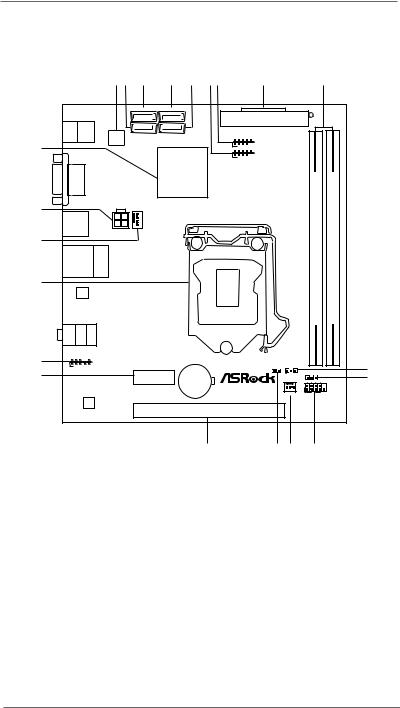
1.3 Motherboard Layout (H61M-VG3 / H61M-VS3) |
|
||||||||||||
|
|
|
1 |
2 |
3 |
4 |
5 |
6 |
7 |
8 |
|
|
9 |
|
|
|
|
|
SATA_0 (PORT 0) |
SATA_2 (PORT 4) |
|
|
|
|
|
|
|
|
K |
|
|
|
|
|
|
|
|
ATXPWR1 |
|
|
|
|
|
|
|
|
|
|
|
|
|
|
|
|
|
|
eyboard PS2 Mouse PS2 |
|
32Mb |
|
SATA_1 (PORT 1) |
SATA_3 (PORT 5) |
|
|
|
|
|
|
|
|
|
|
|
|
|
|
|
|
|
||||
|
|
|
BIOS |
|
|
|
|
|
|
|
|
|
|
|
|
|
|
|
|
|
|
|
1 |
USB4_5 |
|
|
|
21 |
|
|
|
|
|
|
|
|
|
|
|
|
|
|
|
|
|
|
|
|
|
|
1 |
USB6_7 |
|
|
|
|
VGA1 |
|
|
|
|
Intel |
|
|
|
DDR3 XFastRAM |
|
|
|
|
|
|
|
|
|
H61 |
|
|
|
|
|
||
|
|
|
|
|
|
|
|
|
|
|
|
|
|
|
B: USB1 |
|
RoHS |
|
|
|
|
|
XFast USB |
module) |
module) |
||
20 |
|
|
|
CPU_FAN1 |
|
|
|
|
|
|
|||
|
USB 2.0 |
|
|
|
|
|
|
|
|
|
|
|
|
|
T: USB0 |
|
|
|
|
|
|
|
|
|
|
|
|
|
|
|
ATX12V1 |
|
|
|
|
|
|
|
pin |
pin |
|
19 |
|
|
|
|
|
|
|
|
|
|
|
||
|
USB 2.0 |
|
|
|
|
|
|
|
|
|
|
240- |
240- |
|
|
RJ-45 |
|
|
|
|
|
|
|
|
bit, |
bit, |
|
|
B: USB3 |
|
|
|
|
|
|
|
|
|
|||
|
T: USB2 |
|
Top: |
|
|
|
|
|
|
|
|
|
|
|
|
|
|
|
|
|
|
|
|
|
|
(64 |
(64 |
18 |
|
|
|
|
|
|
|
|
|
|
|
A1 |
B1 |
|
LAN |
|
|
|
|
|
|
|
|
|
|
DDR3 |
DDR3 |
|
|
|
|
|
|
|
|
|
|
|
|
||
|
MI Bottom: FRON Center: LIN C E IN T I N |
Top: |
XFast LAN |
|
|
|
|
|
|
|
|
||
|
|
|
|
|
|
|
|
|
|
|
|
||
|
HD_AUDIO1 |
|
|
|
|
|
|
|
|
|
|
|
|
17 |
1 |
|
|
|
|
|
|
|
|
|
|
|
|
|
|
|
|
|
|
|
|
|
|
|
|
|
|
|
|
|
|
|
|
|
|
|
|
CI1 |
|
|
10 |
|
|
|
|
|
|
|
|
|
|
1 |
1 |
|
|
16 |
|
|
|
|
PCIE1 |
|
|
|
|
CLRCMOS1 |
PLED1 |
|
|
|
|
|
|
CMOS |
|
|
|
11 |
|||||
|
|
|
|
|
|
|
1 |
|
|||||
|
|
|
|
|
|
|
|
|
|
|
|
PLED PWRBTN |
|
|
|
|
|
|
|
|
BATTERY |
|
|
|
|
|
|
|
|
|
|
|
|
|
|
|
|
|
1 |
|
|
|
|
|
|
|
|
|
|
|
|
|
CHA_FAN1 |
HDLED RESET |
|
|
|
|
|
|
|
|
|
|
|
|
|
PANEL1 |
|
|
AUDIO |
|
|
|
|
|
|
|
|
|
|
|
|
|
CODEC |
|
|
|
|
|
|
|
|
|
|
|
|
|
|
|
|
|
|
|
|
PCIE2 |
|
|
|
|
|
|
|
|
|
|
|
|
|
15 |
|
14 |
13 |
12 |
|
1 |
32Mb SPI Flash |
11 |
Power LED Header (PLED1) |
2 |
SATA2 Connector (SATA_1 (PORT 1)) |
12 |
System Panel Header (PANEL1) |
3 |
SATA2 Connector (SATA_0 (PORT 0)) |
13 |
Chassis Fan Connector (CHA_FAN1) |
4 |
SATA2 Connector (SATA_2 (PORT 4)) |
14 |
Chassis Intrusion Header (CI1) |
5 |
SATA2 Connector (SATA_3 (PORT 5)) |
15 |
PCI Express 3.0 x16 Slot (PCIE2) |
6 |
USB 2.0 Header (USB6_7) |
16 |
PCI Express 2.0 x1 Slot (PCIE1) |
7 |
USB 2.0 Header (USB4_5) |
17 |
Front Panel Audio Header (HD_AUDIO1) |
8 |
ATX Power Connector (ATXPWR1) |
18 |
1155-Pin CPU Socket |
9 |
2 x 240-pin DDR3 DIMM Slots |
19 |
CPU Fan Connector (CPU_FAN1) |
|
(Dual Channel: DDR3_A1, DDR3_B1) |
20 |
ATX 12V Power Connector (ATX12V1) |
10 |
Clear CMOS Jumper (CLRCMOS1) |
21 |
Intel H61 Chipset |
13
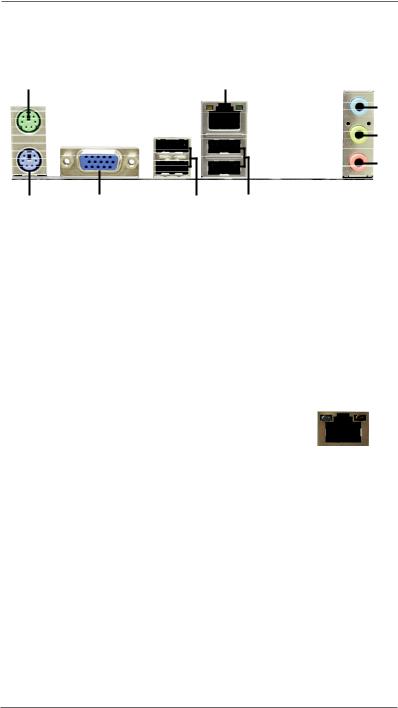
1.4 I/O Panel (H61M-VG3)
1 |
2 |
3
4
5
9 |
|
8 |
7 |
6 |
|
1 |
PS/2 Mouse Port (Green) |
6 |
USB 2.0 |
Ports (USB23) |
|
* 2 |
LAN |
RJ-45 Port |
7 |
USB 2.0 |
Ports (USB01) |
3 |
Line |
In (Light Blue) |
8 |
VGA Port |
|
** 4 |
Front Speaker (Lime) |
9 |
PS/2 Keyboard Port (Purple) |
||
5Microphone (Pink)
*There are two LED next to the LAN port. Please refer to the table below for the LAN port LED indications.
LAN Port LED Indications
Activity/Link LED |
|
SPEED LED |
ACT/LINK |
SPEED |
|||||
|
LED |
LED |
|||||||
Status |
Description |
|
Status |
|
Description |
||||
|
|
|
|
|
|
||||
|
|
|
|
||||||
Off |
No Link |
|
Off |
|
10Mbps connection |
|
|
|
|
|
|
|
|
||||||
Blinking |
Data Activity |
|
Orange |
|
100Mbps connection |
|
|
|
|
On |
Link |
|
Green |
|
1Gbps connection |
LAN Port |
|||
|
|
|
|
|
|
||||
|
|
|
|
|
|
||||
**To enable Multi-Streaming function, you need to connect a front panel audio cable to the front panel audio header. Please refer to below steps for the software setting of Multi-Streaming. For Windows® XP:
After restarting your computer, you will find “Mixer” tool on your system. Please select “Mixer
ToolBox”  , click “Enable playback multi-streaming”, and click “ok”. Choose “2CH” or “4CH” and then you are allowed to select “Realtek HDA Primary output” to use Rear Speaker and Front Speaker, or select “Realtek HDA Audio 2nd output” to use front panel audio. Then reboot your system.
, click “Enable playback multi-streaming”, and click “ok”. Choose “2CH” or “4CH” and then you are allowed to select “Realtek HDA Primary output” to use Rear Speaker and Front Speaker, or select “Realtek HDA Audio 2nd output” to use front panel audio. Then reboot your system.
For Windows® 8 / 7 / VistaTM:
After restarting your computer, please double-click “Realtek HD Audio Manager” on the system tray. Set “Speaker Configuration” to “Quadraphonic” or “Stereo”. Click “Device advanced settings”, choose “Make front and rear output devices playbacks two different audio streams simultaneously”, and click “ok”. Then reboot your system.
14

1.5 I/O Panel (H61M-VS3)
1 |
2 |
3
4
5
9 |
|
8 |
7 |
6 |
|
1 |
PS/2 Mouse Port (Green) |
6 |
USB 2.0 |
Ports (USB23) |
|
* 2 |
LAN |
RJ-45 Port |
7 |
USB 2.0 |
Ports (USB01) |
3 |
Line |
In (Light Blue) |
8 |
VGA Port |
|
** 4 |
Front Speaker (Lime) |
9 |
PS/2 Keyboard Port (Purple) |
||
5Microphone (Pink)
*There are two LED next to the LAN port. Please refer to the table below for the LAN port LED indications.
LAN Port LED Indications
Activity/Link LED |
|
SPEED LED |
ACT/LINK |
SPEED |
|||||
|
LED |
LED |
|||||||
|
|
|
|
|
|
||||
Status |
Description |
|
Status |
|
Description |
|
|
|
|
|
|
|
|
||||||
Off |
No Link |
|
Off |
|
10Mbps connection |
|
|
|
|
|
|
|
|
||||||
Blinking |
Data Activity |
|
On |
|
100Mbps connection |
|
|
|
|
On |
Link |
|
|
|
|
LAN Port |
|||
|
|
|
|
|
|
||||
|
|
|
|
|
|
||||
**To enable Multi-Streaming function, you need to connect a front panel audio cable to the front panel audio header. Please refer to below steps for the software setting of Multi-Streaming. For Windows® XP:
After restarting your computer, you will find “Mixer” tool on your system. Please select “Mixer
ToolBox”  , click “Enable playback multi-streaming”, and click “ok”. Choose “2CH” or “4CH” and then you are allowed to select “Realtek HDA Primary output” to use Rear Speaker and Front Speaker, or select “Realtek HDA Audio 2nd output” to use front panel audio. Then reboot your system.
, click “Enable playback multi-streaming”, and click “ok”. Choose “2CH” or “4CH” and then you are allowed to select “Realtek HDA Primary output” to use Rear Speaker and Front Speaker, or select “Realtek HDA Audio 2nd output” to use front panel audio. Then reboot your system.
For Windows® 8 / 7 / VistaTM:
After restarting your computer, please double-click “Realtek HD Audio Manager” on the system tray. Set “Speaker Configuration” to “Quadraphonic” or “Stereo”. Click “Device advanced settings”, choose “Make front and rear output devices playbacks two different audio streams simultaneously”, and click “ok”. Then reboot your system.
15

Chapter 2: Installation
This is a Micro ATX form factor motherboard. Before you install the motherboard, study the configuration of your chassis to ensure that the motherboard fits into it.
Make sure to unplug the power cord before installing or removing the motherboard. Failure to do so may cause physical injuries to you and damages to motherboard components.
2.1 Screw Holes
Place screws into the holes indicated by circles to secure the motherboard to the chassis.
Do not over-tighten the screws! Doing so may damage the motherboard.
2.2 Pre-installation Precautions
Take note of the following precautions before you install motherboard components or change any motherboard settings.
1.Unplug the power cord from the wall socket before touching any component.
2.To avoid damaging the motherboard components due to static electricity, NEVER place your motherboard directly on the carpet or the like. Also remember to use a grounded wrist strap or touch a safety grounded object before you handle components.
3.Hold components by the edges and do not touch the ICs.
4.Whenever you uninstall any component, place it on a grounded antistatic pad or in the bag that comes with the component.
Before you install or remove any component, ensure that the power is switched off or the power cord is detached from the power supply.
Failure to do so may cause severe damage to the motherboard, peripherals, and/or components.
16
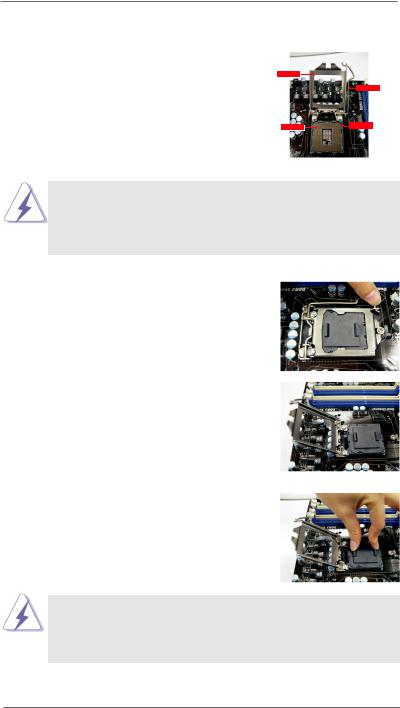
2.3 CPU Installation
For the installation of Intel 1155-Pin CPU, please follow the steps below.
Load Plate
Load Lever
Socket Body
Contact Array
1155-Pin Socket Overview
Before you insert the 1155-Pin CPU into the socket, please check if the CPU surface is unclean or if there is any bent pin on the socket. Do not force to insert the CPU into the socket if above situation is found. Otherwise, the CPU will be seriously damaged.
Step 1. Open the socket:
Step 1-1. Disengaging the lever by depressing down and out on the hook to clear retention tab.
Step 1-2. Rotate the load lever to fully open position at approximately 135 degrees.
Step 1-3. Rotate the load plate to fully open position at approximately 100 degrees.
Step 2. Remove PnP Cap (Pick and Place Cap).
1.It is recommended to use the cap tab to handle and avoid kicking off the PnP cap.
2.This cap must be placed if returning the motherboard for after service.
17
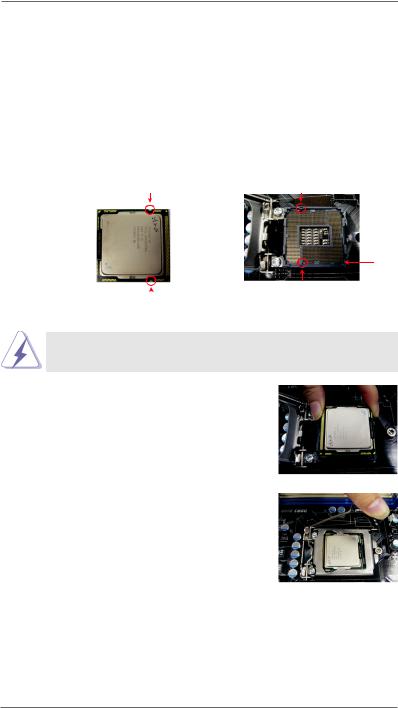
Step 3. Insert the 1155-Pin CPU:
Step 3-1. Hold the CPU by the edge where is marked with black line.
Step 3-2. Orient the CPU with IHS (Integrated
Heat Sink) up. Locate Pin1 and the two orientation key notches.
 line black
line black
orientation key notch |
alignment key |
Pin1 
Pin1
|
|
alignment key |
|
|
1155-Pin Socket |
orientation key notch |
||
1155-Pin CPU |
|
|
For proper inserting, please ensure to match the two orientation key notches of the CPU with the two alignment keys of the socket.
Step 3-3. Carefully place the CPU into the socket by using a purely vertical motion.
Step 3-4. Verify that the CPU is within the socket and properly mated to the orient keys.
Step 4. Close the socket:
Step 4-1. Rotate the load plate onto the IHS. Step 4-2. While pressing down lightly on load
plate, engage the load lever.
18
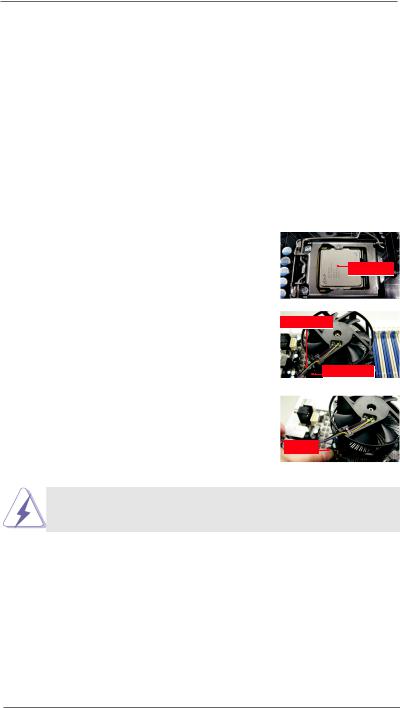
2.4Installation of CPU Fan and Heatsink
This motherboard is equipped with 1155-Pin socket that supports Intel 1155-Pin CPU. Please adopt the type of heatsink and cooling fan compliant with Intel 1155Pin CPU to dissipate heat. Before you installed the heatsink, you need to spray thermal interface material between the CPU and the heatsink to improve heat dissipation. Ensure that the CPU and the heatsink are securely fastened and in good contact with each other. Then connect the CPU fan to the CPU_FAN connector
(CPU_FAN1, see page 13, No. 19).
For proper installation, please kindly refer to the instruction manuals of your CPU fan and heatsink.
Below is an example to illustrate the installation of the heatsink for 1155-Pin CPU. Step 1. Apply thermal interface material onto center of
IHS on the socket surface.
Step 2. Place the heatsink onto the socket. Ensure fan cables are oriented on side closest to the CPU fan connector on the motherboard (CPU_
FAN1, see page 13, No. 19).
Step 3. Align fasteners with the motherboard throughholes.
Step 4. Rotate the fastener clockwise, then press down on fastener caps with thumb to install and lock. Repeat with remaining fasteners.
If you press down the fasteners without rotating them clockwise, the heatsink cannot be secured on the motherboard.
Step 5. Connect fan header with the CPU fan connector on the motherboard. Step 6. Secure excess cable with tie-wrap to ensure cable does not interfere with
fan operation or contact other components.
19

2.5 Installation of Memory Modules (DIMM)
This motherboard provides two 240-pin DDR3 (Double Data Rate 3) DIMM slots, and supports Dual Channel Memory Technology. For dual channel configuration, you always need to install two identical (the same brand, speed, size and chiptype) memory modules in the DDR3 DIMM slots to activate Dual Channel Memory
Technology. Otherwise, it will operate at single channel mode.
1.It is not allowed to install a DDR or DDR2 memory module into DDR3 slot;otherwise, this motherboard and DIMM may be damaged.
2.If you install only one memory module or two non-identical memory modules, it is unable to activate the Dual Channel Memory Technology.
3.Some DDR3 1GB double-sided DIMMs with 16 chips may not work on this motherboard. It is not recommended to install them on this motherboard.
Installing a DIMM
Please make sure to disconnect power supply before adding or removing DIMMs or the system components.
Step 1. Unlock a DIMM slot by pressing the retaining clips outward.
Step 2. Align a DIMM on the slot such that the notch on the DIMM matches the break on the slot.
The DIMM only fits in one correct orientation. It will cause permanent damage to the motherboard and the DIMM if you force the DIMM into the slot at incorrect orientation.
Step 3. Firmly insert the DIMM into the slot until the retaining clips at both ends fully snap back in place and the DIMM is properly seated.
20

2.6 Expansion Slots (PCI Express Slots)
There are 2 PCI Express slots on this motherboard.
PCIE slots:
PCIE1 (PCIE 2.0 x1 slot) is used for PCI Express cards with x1 lane width cards, such as Gigabit LAN card, SATA2 card, etc.
PCIE2 (PCIE 3.0 x16 slot) is used for PCI Express x16 lane width graphics cards.
Only PCIE2 slot supports Gen 3 speed. To run the PCI Express in Gen 3 speed, please install an Ivy Bridge CPU. If you install a Sandy Bridge CPU, the PCI Express will run only at PCI Express Gen 2 speed.
Installing an expansion card
Step 1. Before installing the expansion card, please make sure that the power supply is switched off or the power cord is unplugged. Please read the documentation of the expansion card and make necessary hardware settings for the card before you start the installation.
Step 2. Remove the system unit cover (if your motherboard is already installed in a chassis).
Step 3. Remove the bracket facing the slot that you intend to use. Keep the screws for later use.
Step 4. Align the card connector with the slot and press firmly until the card is completely seated on the slot.
Step 5. Fasten the card to the chassis with screws. Step 6. Replace the system cover.
21
